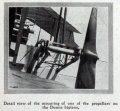Difference between revisions of "John William Dunne: D.5"
(New page: ''Note: This is a sub-section of John William Dunne.'' The Dunne D.5 was an experimental aircraft built in the United Kingdom in 1910. Designed by John William Dunne and built by [[...) |
|||
| Line 3: | Line 3: | ||
The Dunne D.5 was an experimental aircraft built in the United Kingdom in 1910. | The Dunne D.5 was an experimental aircraft built in the United Kingdom in 1910. | ||
Designed by John William Dunne and built by [[Short Brothers]], it was a highly unorthodox biplane along the same lines as the [[John William Dunne: D.1| D.1 | Designed by John William Dunne and built by [[Short Brothers]], it was a highly unorthodox biplane along the same lines as the [[John William Dunne: D.1| D.1]] tailless design Dunne had designed in secret for the [[Royal Aircraft Factory| Army Balloon Factory]] years previously. | ||
After the War Office discontinued funding for Dunne's work, he proceeded to develop his ideas privately, with this aircraft being the first built. Like its military predecessors, it was a biplane with highly-swept wings driven by twin pusher propellers. However, with a considerably more powerful engine than they had, the Dunne D.5 took off under its own power on its first attempt, piloted by Dunne himself, in the summer of 1910. | After the War Office discontinued funding for Dunne's work, he proceeded to develop his ideas privately, with this aircraft being the first built. Like its military predecessors, it was a biplane with highly-swept wings driven by twin pusher propellers. However, with a considerably more powerful engine than they had, the Dunne D.5 took off under its own power on its first attempt, piloted by Dunne himself, in the summer of 1910. | ||
Revision as of 16:43, 30 July 2009
Note: This is a sub-section of John William Dunne.
The Dunne D.5 was an experimental aircraft built in the United Kingdom in 1910.
Designed by John William Dunne and built by Short Brothers, it was a highly unorthodox biplane along the same lines as the D.1 tailless design Dunne had designed in secret for the Army Balloon Factory years previously.
After the War Office discontinued funding for Dunne's work, he proceeded to develop his ideas privately, with this aircraft being the first built. Like its military predecessors, it was a biplane with highly-swept wings driven by twin pusher propellers. However, with a considerably more powerful engine than they had, the Dunne D.5 took off under its own power on its first attempt, piloted by Dunne himself, in the summer of 1910.
Two demonstration flights were made for the Royal Aero Club in December 1910, one of which was witnessed by the visiting Orville Wright. After which a licence was sold to Burges for sale of aeroplanes built to this plan which sold several examples in the USA.
Gallery of Images
Sources of Information
- [1] Wikipedia














